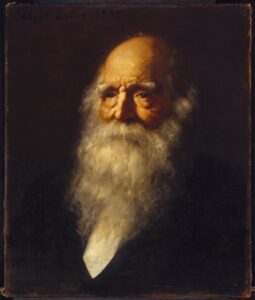 Wanting to see how Suno would handle an historic, well-known, free-form poem, I prompted the AI-bot with a slightly modified version of the final stanza of Thanatopsis by one of the great American poets of the early 19th century, William Cullen Bryant. Stylistically, I opted for a male voice with slow nylon-string guitar accompaniment, and violin as the solo instrument.
Wanting to see how Suno would handle an historic, well-known, free-form poem, I prompted the AI-bot with a slightly modified version of the final stanza of Thanatopsis by one of the great American poets of the early 19th century, William Cullen Bryant. Stylistically, I opted for a male voice with slow nylon-string guitar accompaniment, and violin as the solo instrument.
Given the non-existent meter of the poem and the stylistic limitations I placed upon the AI, I thought Suno did fairly well. Contact me with any comments, and I’ll likely respond.
BACKSTORY: I had memorized this excerpt in my junior year of high school at the behest of my favorite English teacher, Ms. Beckley, and the lines have stayed with me all these years. I’ve always considered them damn good advice.
Bryant’s unmodified final stanza reads thusly:
So live, that when thy summons comes to join
The innumerable caravan, which moves
To that mysterious realm, where each shall take
His chamber in the silent halls of death,
Thou go not, like the quarry-slave at night,
Scourged to his dungeon, but, sustained and soothed
By an unfaltering trust, approach thy grave,
Like one who wraps the drapery of his couch
About him, and lies down to pleasant dreams.

According to Wikipedia: When and where Bryant wrote “Thanatopsis” is unclear, and Bryant himself could not remember when he wrote the verse. According to Parke Godwin, Bryant’s friend, Bryant wrote the poem when he was seventeen years old in mid-1811, just after he had left Williams College.
Bryant reportedly wrote his first draft of “Thanotopsis” in Flora’s Glen in Williamstown.
In History of American Literature, two dates are stated for the authoring of “Thanatopsis”, 1811 and 1816 Bryant’s inspiration for “Thanatopsis” came after reading William Wordsworth’s Lyrical Ballads, as well as Robert Blair’s “The Grave”, Beilby Porteus’s “Death” and Kirke White’s “Time”.
After Bryant had left Cummington to begin his law studies, his father discovered a manuscript in Bryant’s desk drawer, that contained “Thanatopsis” and a fragment of a poem, which would be published under the title “The Fragment” and later titled “An Inscription upon the Entrance to a Wood”. He sent the two poems without his son’s knowledge to the editors at the North American Review, where they were published in September 1817.
![]()
